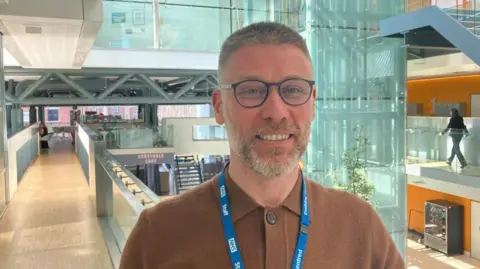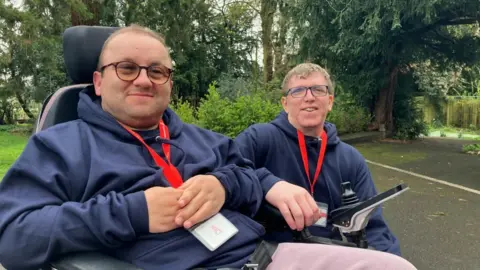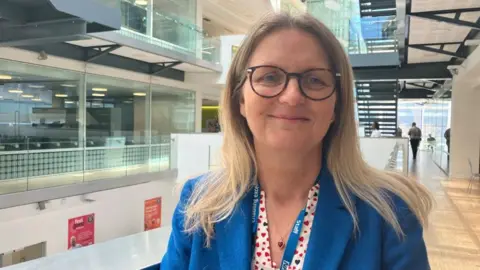Oliver McGowan training 'lifted scales from my eyes'
 Vikki Irwin/BBC
Vikki Irwin/BBCA senior doctor says he is shocked at how many deaths of people with learning disabilities and autism are "potentially preventable by really basic things".
Dr Andrew Kelso is a consultant neurologist and the executive medical director at the Suffolk and North East Essex Integrated Care Board (SNEE ICB).
The ICB, which commissions all health services, has rolled out the Oliver McGowan Mandatory Training on Learning Disability and Autism to its health and social care professionals.
"That's the thing that keeps me awake at night," Dr Kelso told the BBC. "How little I knew before I went and how much I knew afterwards, and what a missed opportunity that might have been for me."
The mandatory training - for all NHS staff who work with the public - is named after Oliver McGowan, an 18-year-old from Bristol who died in 2016 after he was given an anti-psychotic drug he was allergic to, despite repeated warnings from his parents.
His mother Paula had lobbied for mandatory training to potentially "save lives".
The NHS England target for the training is a third of staff. More than 70% of the SNEE ICB workforce have taken it, the highest in the region.
 Family handout
Family handoutIn March 2024, there were 5,591 people with a learning disability or autism registered with a GP in Suffolk and North East Essex.
Dr Kelso, a consultant specialising in epilepsy, said: "I thought I knew quite a lot about learning disability.
"But the scales fell off my eyes when I was in the training and realised how much I didn't know - and that's in a career where I see people with learning disability all the time.
"How many gaps are there in the knowledge of people that don't spend their entire career with learning disability and may just come across them every now and then?
"That's the thing that keeps me awake at night, how little I knew before I went and how much I knew afterwards, and what a missed opportunity that might have been for me. And what a missed opportunity it might be for other clinicians."
'Reduce the risk'
A Learning Disabilities Mortality Review (LeDeR) is published for each integrated care board, and analyses the lives and death of people with learning disabilities or autism.
The SNEE ICB review said the life expectancy of someone with a learning disability or autism was 60 years old, 20 years below the rest of the population.
It also pointed to aspiration pneumonia as a leading cause of death.
According to Dr Kelso, aspiration pneumonia is "when the contents of your food go down your windpipe by mistake and introduce bacteria and sometimes chemicals in the lungs".
He said understanding that someone may need more assistance could "markedly reduce the risk of someone with learning disability getting aspiration pneumonia and potentially reduce the risk of them dying".
'We are Oliver's voice'
 Vikki Irwin/BBC
Vikki Irwin/BBCOwen Torence-Smith and Emile Eno-Daynes work with Ace Anglia, a disability advocacy service, to deliver the Oliver McGowan training, as people with lived experience of a learning disability and autism.
Mr Torence-Smith, from Ipswich, has been educating healthcare professionals about autism for more than a year.
"When I heard Oliver's story, it really hit me quite hard and I wanted to try and make a difference to avoid any more deaths," he said.
"We're Oliver's voice, he hasn't got a voice. He lost his life. I'm doing this for him and for his mum and for his family."
Mr Eno-Daynes, from Stowmarket, says he shares his personal experiences of living with a learning disability.
"Some of the people training are really surprised at how I cope in day to day life," he said.
"If this training wouldn't have happened there would have been more people with autism or learning disabilities in hospital having avoidable deaths.
"This training is crucial."
 Vikki Irwin/BBC
Vikki Irwin/BBCBeing employed to deliver the training has given both Mr Torence-Smith and Mr Eno-Daynes paid employment and skills.
This was the vision of Wendy Scott, the deputy director of nursing for learning disability and autism and clinical services at SNEE ICB.
She designed how the ICB would deliver the mandatory training and commissioned Ace Anglia to employ trainers with learning disabilities and autism so they were fully supported.
"There's a whole list of mandatory training in the NHS and it's a bit dry to be honest," Mrs Scott said.
"They've absolutely loved it. It's because they're interacting with real people and their experience of the health service."
Follow Suffolk news on BBC Sounds, Facebook, Instagram and X.
